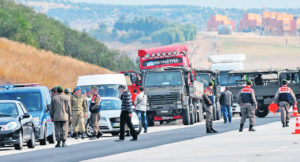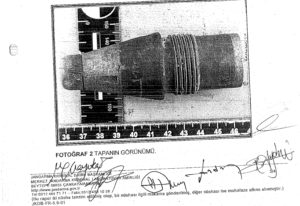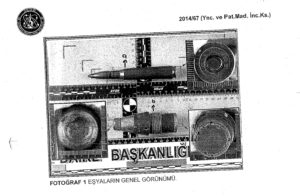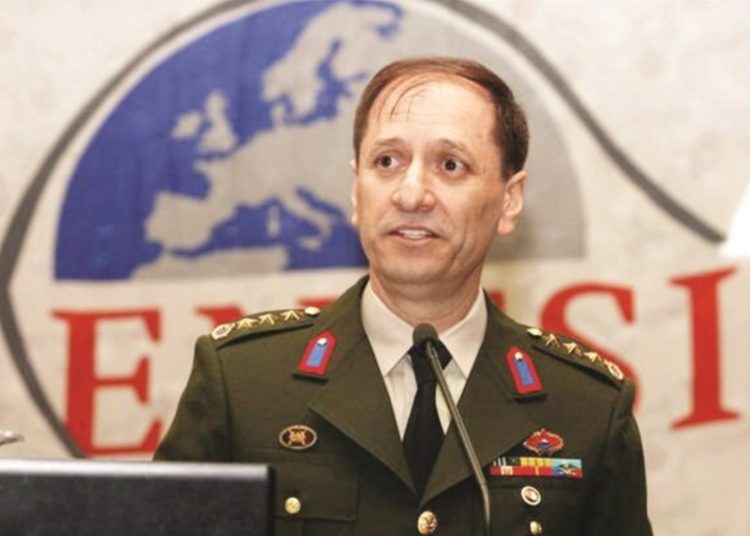Abdullah Bozkurt/Stockholm
A senior forensics expert whose team verified the origin of intercepted heavy weaponry bound for jihadists in Syria was punished by the government of President Recep Tayyip Erdoğan for his role in the exposé of illegal arms shipments to Syria by Turkish intelligence agency MIT.
According to confidential documents obtained by Nordic Monitor, Burhanettin Cihangiroğlu, former chairman of the European Network of Forensic Science Institutes (ENFSI) and former head of the Gendarmerie Forensics Department (Jandarma Kriminal Daire Başkanlığı, or JKDB) in Turkey, played a crucial role in the verification and identification of mortars found in intercepted Syria-bound trucks in January 2014.
Cihangiroğlu’s team in Ankara was ordered by the investigating prosecutor to run forensic tests, identify and verify the lethal weaponry as part of a criminal investigation into allegations that the arms were destined for al-Qaeda in Syria. As part of standard operating procedure, the forensic experts ran tests and presented their findings to the office of the prosecutor as requested.
Embarrassed and panicked over the scandalous exposé of illegal shipments by MIT, the Erdoğan government rushed to intervene in the case and eventually managed to hush up the investigation in a clear case of executive branch interference in the judiciary. The prosecutors, judges, police, gendarmes and others who were involved in the investigation were all later dismissed and/or jailed on fabricated charges.
Testimony of Burhanettin Cihangiroğlu in court revealed a government plot to hush up illegal arms shipments:
Cihangiroğlu, a retired colonel, is a veteran forensic expert who served in the Turkish military for 40 years and established the first forensic unit in the gendarmerie, part of the military that also serves as law enforcement for the Interior Ministry in the rural areas of Turkey. He and his team of seven criminologists were all arrested in 2015 simply because they had complied with the prosecutor’s orders as they were required to do under Turkish law.
In a May 4, 2016 hearing held at the Istanbul 7th Criminal Court of Peace, Cihangiroğlu defended his record, saying he had run the forensic unit since 2005 and had never faced any investigation over his conduct, be it administrative or legal. He emphasized that not a single report he had given in his 25-year career as a forensic expert was challenged or rejected by the courts.
Forensic lab report on seized weapons that was bound for jihadists in Syria:
“On the day an investigation was launched by the Adana Public Prosecutor’s Office, the truck was stopped and its cargo confiscated. The prosecutor appointed us as official experts for the examination [of samples from the cargo]”, he explained, noting that everything was done by the book.
In two separate incidents that took place on Jan. 1 and Jan. 19, 2014, Turkish prosecutors intercepted arms-laden trucks that were bound for Syria. The shipment was escorted by the Turkish intelligence agency, although there was no official authorization as required by Turkish law. Under orders from prosecutors on the scene, gendarmes took samples from the cargo on Jan.19, and they were sent to Ankara to the Gendarmerie Forensic Department for further examination.

According to the expert report issued by Cihangiroğlu’s team in Ankara, a sample fuse was ready for use in artillery cannons ranging in size from 3.3 to 5.9 inches (85–152 millimeters). The experts referenced their findings in Jane’s Ammunition Handbook and concluded that the fuse was a Russian-developed V-429-type model that is manufactured in several former Soviet bloc countries such as Bulgaria, Ukraine, Slovakia and Czech Republic. The fuse ― which can also be set for delayed-action in bombs designed to explode after hitting the target and are prepared to detonate at impact — is called “Super-Quick” in industry terminology, the report said. The experts agreed that the fuses contained highly incendiary substances and were designated as controlled explosives under Turkish law.
The second sample included an artillery cartridge identified as AP1-B32, which is used in heavy machine guns. The armor-piercing cartridge has been used in various type machine guns and rifles such as the DShK, NSV/NVSVT, YakB-12.7, Type 77, 85, 88 (QJC-88), 89 (QJZ-89), Gepard, V-94, OSV-96, KSVK. The numbers *188*81 were imprinted on the cartridge base, indicating that it was made in Soviet Russia’s Novosibirsk ammunition factory.
The forensic lab report dealt a huge blow to the Erdoğan government’s false narrative, which claimed that the cargo was humanitarian aid to Turkmens in Syria.

It also turned out that the MIT agents had no proper authorization to transport such a dangerous load within Turkey or across the border. In fact when the MIT agents were detained on the scene after trucks were intercepted, they failed to present paperwork to the prosecutor, who asked for documentary evidence confirming that the arms shipment was authorized in line with the law.
The prosecutors who were looking into arms shipments were arbitrarily sacked and reassigned. The Erdoğan government also orchestrated an investigation into five Turkish prosecutors who had been working in Adana province and were involved in investigating illegal arms shipments to jihadist groups in Syria. The prosecutors targeted by the government were Süleyman Bağrıyanık, the chief public prosecutor in Adana province; Ahmet Karaca, the deputy chief public prosecutor; Aziz Takçı, a public prosecutor; Özcan Şişman, a public prosecutor; and Yaşar Kavalcıoğlu, the chief public prosecutor in the Kırıkhan district of Adana province.

Cihangiroğlu is yet another senior official who faced the wrath of the Erdoğan government for his lab’s involvement in verifying and identifying weapons found in the trucks. He said he enlisted in the military when he was 15 years old and had served the nation with a distinction for 40 years and questioned the government’s motive for arresting him on baseless charges.
“I was appointed in 1989 to establish the Gendarmerie Forensic Department, and I served in every position there. Some 600,000 reports were issued under my leadership, and not a single one was contested. We are the first [Turkish] institution that was accredited to the European Union,” he told the court, adding that he led ENFSI after defeating two other candidates in elections. He said he has numerous articles and presentations on forensic science to his credit.
The government levelled multiple charges against him as part of an intimidation campaign against other forensic experts and made him an example to force others to fall in line with the government narrative. The top forensic expert was arrested on November 30, 2015 and released on June 7, 2016 pending trial. On July 13, 2018 he was arrested again on charges that he was associated with the Gülen movement, a group critical of the Erdoğan government, and remained in prison until February 2019, when he was released. The court cases against him are still pending.












